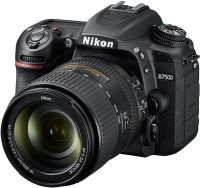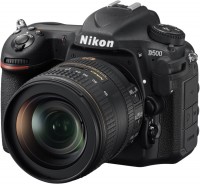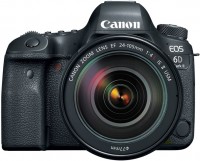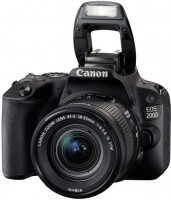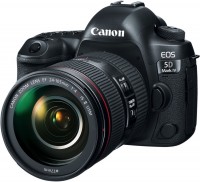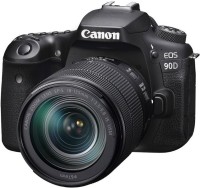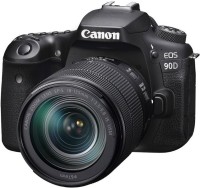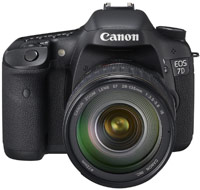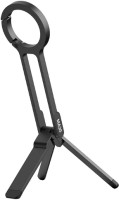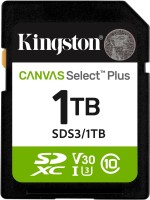Canon EOS 650D kit 17-85
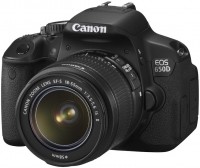 | Outdated Product SLR camera, notable for a number of interesting solutions. So, for the first time in the EOS series, a dual autofocus system is used in it, which allows you to use tracking autofocus even when shooting video (the maximum video resolution, by the way, is 1920x1080). The screen, for the first time among "DSLRs" Canon, is made touch, and the software part includes a number of "intelligent" auto modes that make life easier for beginners. The basis of the hardware is an 18.7-megapixel APS-C matrix and a DIGIC 5 processor, which provides burst shooting at 5 fps. Complete with lens. |
Canon EOS 650D kit 17-85
Panel:APS-C (23x15.5 mm), 18 MPix
Focal length:17 - 85 mm
Lens aperture:f/4.0 - f/5.6
Video:Full HD (1080p)
Snapshot size:5184x3456 px
ISO range:100-12800
Burst shooting:5 fps
Screen:3 '', touch, oscillating
SLR camera, notable for a number of interesting solutions. So, for the first time in the EOS series, a dual autofocus system is used in it, which allows you to use tracking autofocus even when shooting video (the maximum video resolution, by the way, is 1920x1080). The screen, for the first time among "DSLRs" Canon, is made touch, and the software part includes a number of "intelligent" auto modes that make life easier for beginners. The basis of the hardware is an 18.7-megapixel APS-C matrix and a DIGIC 5 processor, which provides burst shooting at 5 fps. Complete with lens.
All specifications
Specifications EOS 650D kit 17-85
|
| |||||||||||||||||||||||||||||||||||||||||||||||||||||||||||||||||||||||||||||||||||||||||||||||||||||||||||||||||||||||||||||||||||||||||||||||||||||||||||||||||||||||||||||||
The information in the model description is for reference purposes.
Always clarify the specifications and configuration of the product with the online store manager before purchasing.
Catalog Canon 2025 - new arrivals, bestsellers, and the most relevant models Canon.
Always clarify the specifications and configuration of the product with the online store manager before purchasing.
Catalog Canon 2025 - new arrivals, bestsellers, and the most relevant models Canon.
Model overview based on user reviews
The Canon EOS 650D kit 18-55 is a digital SLR camera that offers a blend of modern features and affordability. Users appreciate its touchscreen display, which enhances usability, and the swivel screen that aids in capturing shots from various angles. The camera is noted for its good build quality and ergonomic design, making it comfortable to handle. It features an 18MP sensor, providing good photo quality for its price range, although some users report noise at higher ISOs and in low light conditions. Autofocus is generally praised for its speed and accuracy, but some find it lacking in video mode. The camera's video capabilities are well-received, with stereo sound and autofocus in video mode being highlights. Battery life is decent, but an additional battery is recommended for extended use. While some users criticize the image quality compared to higher-end models, the camera is considered a solid choice for beginners and those looking for a reliable, entry-level DSLR. Overall, it is seen as a good value for money option, especially for those not requiring professional-grade performance.
Pros
Cons
5 3 2 4 |
The model is suitable for both beginners and experienced photographers. Rotatable touchscreen display Easy to operate Microphone jack Lever combined with video recording mode Reliable Overall, I did not find. |
Overall, I'm rather pleased with the purchase. Of course, it takes a little getting used to the new ergonomics; the difference in control is especially noticeable when filming dynamic scenes, when everything is done automatically. Very good as a “second carcass”. For its features, the price is very reasonable. I thought that the touchscreen would cause inconveniences, but nothing like that, it's a definite plus for this model. Especially since some control elements, which were implemented as hardware on older models, have been moved to it. Compared to previous models, it has become lighter and more compact. The feature that allows you to focus on the desired point by pressing that point is very convenient and helps a lot sometimes. The screen is swivel, which I often use when I need to shoot from the ground or above the head. A convenient feature like in modern smartphones – the screen automatically turns off when the device is brought close to your face. The picture quality is beyond praise. The battery lasts at least an entire day of shooting, sometimes even two. Although, I must note that I practically do not use the built-in flash. There is an HDR mode. Its presence is debatable, but it may be useful for someone. Autofocus is now on nine cross-type points, works very quickly and almost silently. This is important when you don't want to attract attention to the photographed subject. Now autofocus is also available in video mode, which is wonderful. Additionally, the video comes with stereo sound. Focusing in “LV” mode and when shooting video is not as fast as we would like. The battery holds really well, but when traveling I found that I simply didn’t have the time or opportunity to charge, so I would recommend immediately buying an additional battery, but just a battery, not a battery handle. If you are not going to purposefully use AA batteries, then it is not advisable to carry such an additional weight to the carcass. The “Trash” button is not very conveniently located in my opinion. |
If everything is well understood about the device's operation, you'll receive a sea of joy, it justifies every penny, and overall it is compared to the Canon D60. A touch display, you can say that it is not needed, you can generally deny technological progress, but in my opinion, it is good, even very good. Focus points, here, of course, you can get by with only the central one. As many people write about the assembly, I will say that my assembly is very, very good, in general, out of all the 650Ds I have held in my hands, I have never seen a bad assembly. By the way, anyone who wants to buy a 700D should note that it is no different from the 650D, the matrix and all other goodies are fully consistent. Overall, I really liked it, I want to note that the assembly of my carcass is Japanese. Everything is about the money, Full Frame will definitely be better, but when it comes to good shots, I advise not to skimp on lenses. In general, I didn't find any drawbacks. use Canon EOS 650D kit 18-55 month or more i recommend it should buy |
3 out of 14 user review(s) shown
10 more user review(s)
Video reviews
Canon EOS 650D features:
Technical equipment and functionality of the camera:
Canon EOS 650D received a hybrid CMOS sensor, which has 18 megapixels and 9 cross-type focus points. The camera is also equipped with a DIGIC 5 processor, which is about six times faster than its predecessor, and the new Canon EF-M mount. In fact, the EOS 650D is a 600D receiver, both in terms of performance and price, but with some improvements and some innovative features.
Display
The main difference from other SLR cameras is the 3-inch capacitive touchscreen display with a resolution of 1040K pixels. The presence of the Multi-Touch function allows you to instantly enlarge the captured photo to the desired size. This function allows you to save time and increase the pressing life of the buttons on the camera body. If you wish, you can completely abandon the button control, since the camera and software allow you to do this. There is a vacuum between the display and the glass, the air has been specially evacuated to reduce glare and improve visibility in bright light.
CPU
The camera is equipped with a new 14-bit DIGIC 5 processor, which automatically processes the image and eliminates chromatic aberration in photographs. In this way, you can significantly save time, which will be useful for those who shoot only in JPEG and rarely use photo editors.
Matrix
As already mentioned, the camera has a new hybrid CMOS sensor. Some of the pixels are used for phase detection autofocus. This allows you to determine the approximate distance and with the help of contrast autofocus, which is auxiliary, to adjust it. Thus, you can quickly adjust autofocus and, without losing sharpness, “track” the movement of an object while shooting a video or in Live View mode.
Ergonomics
Externally, the 650D is not much different from the EOS 600D. The only difference is in the shape and size of the buttons as well as the location of the speaker, otherwise they are identical. On the back side there are nine main and five auxiliary buttons, on the top of the case there is a spinning roller with pre-prepared scenes and automatic settings. There is also a button to quickly change the "iso" sensitivity. Opposite the viewfinder is a roller with sharpness adjustment.
Camera functionality
The camera received a new shutter, with an updated design. With it, you can shoot 5 frames per second and conduct continuous burst shooting. Several new tools have also been added to reduce noise and increase dynamic range. You can now enable "noise filtering" during continuous shooting. The camera takes four pictures, and then reduces the amount of noise in the photo by averaging. This is useful when shooting at night and at high ”iso” This function only works when shooting in JPEG format. For those who will use not only a whale lens, there is a function for saving profiles, in the amount of 20 pcs. At the same time, several profiles were pre-installed for the most popular lenses.
Advantages:
Technical equipment and functionality of the camera:
Canon EOS 650D received a hybrid CMOS sensor, which has 18 megapixels and 9 cross-type focus points. The camera is also equipped with a DIGIC 5 processor, which is about six times faster than its predecessor, and the new Canon EF-M mount. In fact, the EOS 650D is a 600D receiver, both in terms of performance and price, but with some improvements and some innovative features.
Display
The main difference from other SLR cameras is the 3-inch capacitive touchscreen display with a resolution of 1040K pixels. The presence of the Multi-Touch function allows you to instantly enlarge the captured photo to the desired size. This function allows you to save time and increase the pressing life of the buttons on the camera body. If you wish, you can completely abandon the button control, since the camera and software allow you to do this. There is a vacuum between the display and the glass, the air has been specially evacuated to reduce glare and improve visibility in bright light.
CPU
The camera is equipped with a new 14-bit DIGIC 5 processor, which automatically processes the image and eliminates chromatic aberration in photographs. In this way, you can significantly save time, which will be useful for those who shoot only in JPEG and rarely use photo editors.
Matrix
As already mentioned, the camera has a new hybrid CMOS sensor. Some of the pixels are used for phase detection autofocus. This allows you to determine the approximate distance and with the help of contrast autofocus, which is auxiliary, to adjust it. Thus, you can quickly adjust autofocus and, without losing sharpness, “track” the movement of an object while shooting a video or in Live View mode.
Ergonomics
Externally, the 650D is not much different from the EOS 600D. The only difference is in the shape and size of the buttons as well as the location of the speaker, otherwise they are identical. On the back side there are nine main and five auxiliary buttons, on the top of the case there is a spinning roller with pre-prepared scenes and automatic settings. There is also a button to quickly change the "iso" sensitivity. Opposite the viewfinder is a roller with sharpness adjustment.
Camera functionality
The camera received a new shutter, with an updated design. With it, you can shoot 5 frames per second and conduct continuous burst shooting. Several new tools have also been added to reduce noise and increase dynamic range. You can now enable "noise filtering" during continuous shooting. The camera takes four pictures, and then reduces the amount of noise in the photo by averaging. This is useful when shooting at night and at high ”iso” This function only works when shooting in JPEG format. For those who will use not only a whale lens, there is a function for saving profiles, in the amount of 20 pcs. At the same time, several profiles were pre-installed for the most popular lenses.
Advantages:
- New hybrid matrix and powerful processor
- Good picture quality
- Swivel touch display
- Wide dynamic range and plenty of manual settings
- Convenient touch control
- Ability to save settings for twenty different lenses
- Supports the Eye-Fi Connected function, which allows you to transfer footage to a PC or other device via a wireless connection
- Li-ion battery
- Charger
- Neck strap
- USB cable
- Documentation and software


